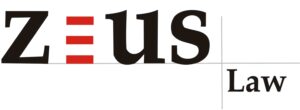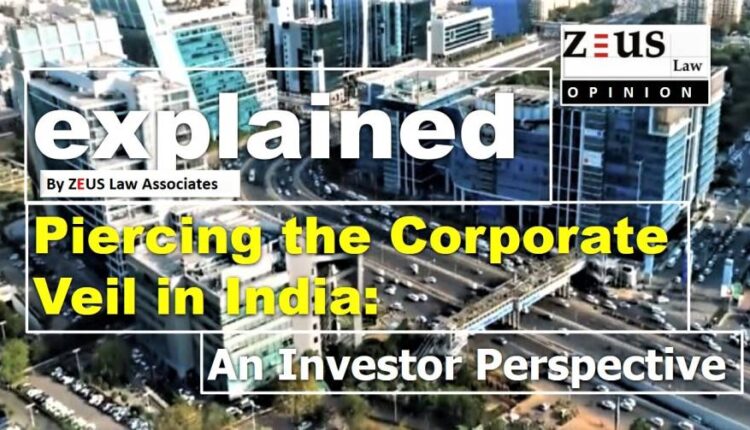Piercing the Corporate Veil In India: An Investor Perspective
Explained by Ms. Pankhuri Jain, Partner, and Ms. Nikita Maheshwari, Associate, ZEUS Law
India is one of the fastest-growing economies in the world. With globalization and recent technological advances, foreign investments in Indian companies are becoming increasingly common. Foreign direct investments can be made in a variety of ways- whether it is opening a subsidiary or associate company in India, acquiring a controlling interest in an existing Indian company, or by means of a merger or joint venture with an Indian company. Furthermore, there is no requirement to be an Indian resident, in order to be a Director in an Indian company.
However, the Indian legal and economic fabric has some unique facets, which such foreign investors must be aware of. The present article will shed light on one such concept, which is the lifting of the corporate veil of a company to impose liabilities on its beneficial owners, shareholders, and Directors. The concept of lifting of the corporate veil of a company is recognized globally, both by statute and Courts, including in Japan, Korea, among other nations.
A company is a juristic person. The corporate veil is a legal metaphor, which separates the company from its members / human agencies. The corporate personality, however, makes it dependent on its human agencies/ individuals, who function on behalf of the company but are immune from its liabilities. The essence of a distinct and separate personality of a company forms one of the fundamentals of company law and the substratum of all commercial arrangements in India, as also enshrined in the Companies Act.
However, given the complexity of commercial transactions and the fraudulent activities and illegalities which may emanate therefrom, an exception to the principle of the company as a separate legal entity has developed. The doctrine of piercing the corporate veil disregards the separate legal personality of the company and attributes the acts of the company to those directly exercising control over operations of the company – such as its directors or ultimate beneficial owners, whether domestic or foreign.
A company’s distinct personality is a statutory privilege which is expected to be used exclusively for a lawful purpose. Where the human agencies in charge of day to day affairs of a company take the corporate personality of the company as a means to commit fraudulent acts, then the courts will take liberties to pierce through the corporate shell.
Since lifting of the corporate veil is an ever evolving concept, there is no exhaustive list of grounds basis which the veil can be pierced. However, the Supreme Court of India has laid down two major instances where the veil is lifted – (i) statutory provisions; and (ii) judicial grounds. Indian law does not distinguish between domestic and foreign investors / beneficial owners / Directors in so far imposition of liability is concerned.
Statutory Provisions
There may be occasions where the company and its members benefit by circumventing the law. The Companies Act imposes fines and penalties for instances of Director and shareholder misconduct and warrants the piercing of corporate veil to ascertain such individual liability.
The Companies Act may disregard the corporate personality before the incorporation/ formation of a company. Issuing a prospectus with misleading information or fraudulently inducing a person to invest money in the company, will attract individual liability.
The Companies Act may also pierce the veil during the working of such a company. For instance, failure to file annual returns of the company, failure to refund application fee, failure to hold shareholder meetings, failure to give notice of board meetings, misdescription of the name of the company and certain related party transactions. The Central Government of India also has the power to pierce the veil to investigate into the ownership of a company and determine its beneficiaries.
Judicial Grounds
The judicial grounds for piercing the corporate shell usually come into play at the stage of utilisation of funds of such a company. One of the most common grounds for lifting the corporate veil by Courts in India is when a company has been used as a vehicle for indulging in fraudulent activities by individuals hiding behind the corporate personality. Where the corporate character is employed for the purpose of committing illegality or for defrauding others, Courts will ignore the corporate character and look at the reality behind the veil.
Personal liability of directors and shareholders of a company also attaches in cases of delinquency of taxes. The Income Tax Authorities may exercise their right to ignore the corporate veil, if the company is formed merely to evade tax and shield its human agencies from legal enforcement.
The Courts in India also possess authority to pierce the veil and hold the concerned individuals accountable in cases where the company’s acts are against public interest or public policy of India. In fact, Courts in India have observed that when a company has been incorporated simply to make gains or avoid welfare law, the veil may be lifted to determine the true intent and character of the company.
The principle of corporate personality is still the universally accepted rule and piercing the corporate veil is the exception to this rule. Through the application of this doctrine in a cautious manner, Courts in India are lifting the veil to put an end to the shams committed behind the cloak of ‘corporate personality’ by both domestic and foreign investors.
There are many instances in which foreign investors, shareholders and Directors get caught in the web of fraud being spun by individuals in India who are actively managing the affairs of such a company. The corporate veil is pierced, imposing liability on such foreign investors, shareholders and Directors. Thus, as a matter of abundant caution, it is imperative that such foreign entities safeguard their individual rights and interests, and participate actively in the management of the company(ies) to prevent any unlawful activities and conduct in their names.
About the Authors:
 Pankhuri Jain has been a practicing lawyer for over 14 years and is a Partner at ZEUS Law. She heads the Project Team, which deals in complex commercial and civil disputes, scams, corporate investigations, etc., spread across various courts and forums. Nikita Maheshwari is an Associate at ZEUS Law and works in the Dispute Resolution practice vertical, with a focus on commercial litigation.
Pankhuri Jain has been a practicing lawyer for over 14 years and is a Partner at ZEUS Law. She heads the Project Team, which deals in complex commercial and civil disputes, scams, corporate investigations, etc., spread across various courts and forums. Nikita Maheshwari is an Associate at ZEUS Law and works in the Dispute Resolution practice vertical, with a focus on commercial litigation.
 ZEUS Law Associates is an ISO certified full service corporate commercial law firm with a team of dedicated and experienced lawyers well versed in handling domestic and cross border transactions across sectors, jurisdictions and regulatory landscapes. The firm’s distinct practice areas include Litigation, Alternate Dispute Resolution, Corporate & Commercial Law, Real Estate & Infrastructure, Indirect Tax and NRI Services.
ZEUS Law Associates is an ISO certified full service corporate commercial law firm with a team of dedicated and experienced lawyers well versed in handling domestic and cross border transactions across sectors, jurisdictions and regulatory landscapes. The firm’s distinct practice areas include Litigation, Alternate Dispute Resolution, Corporate & Commercial Law, Real Estate & Infrastructure, Indirect Tax and NRI Services.



